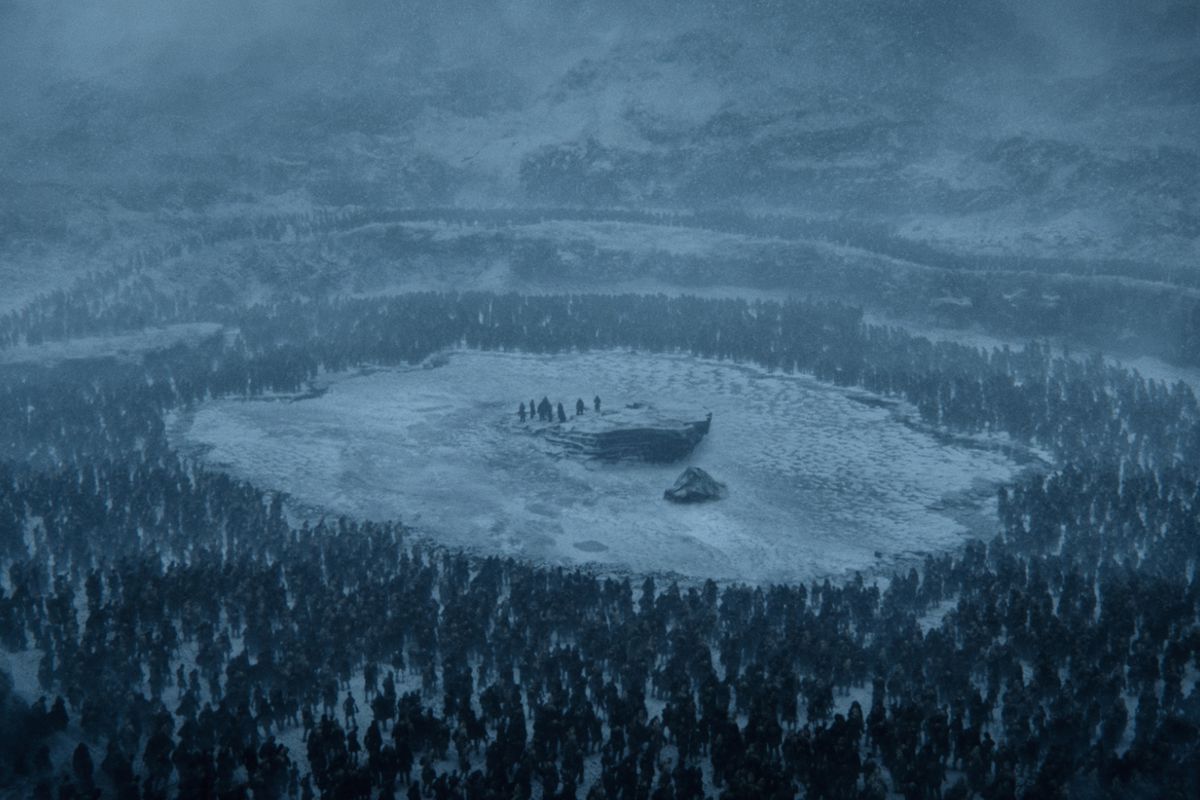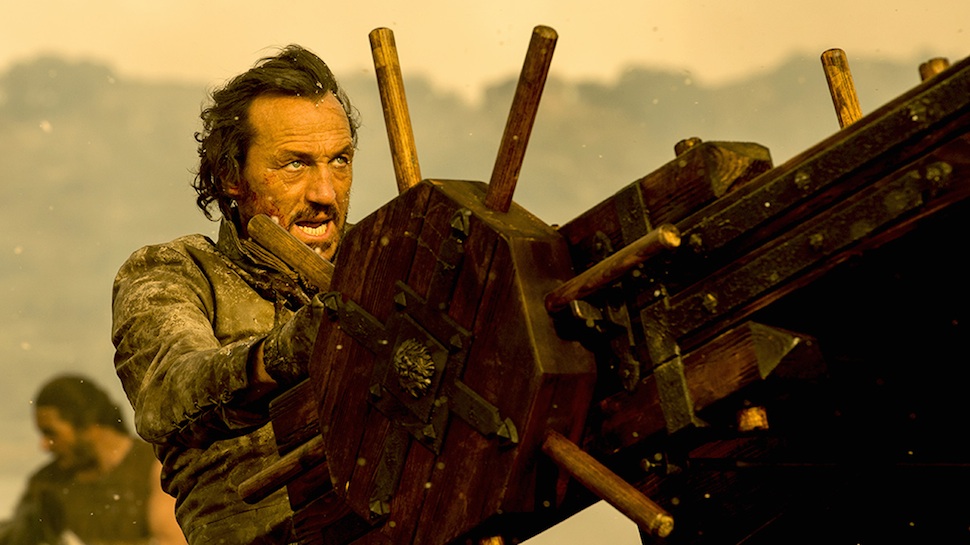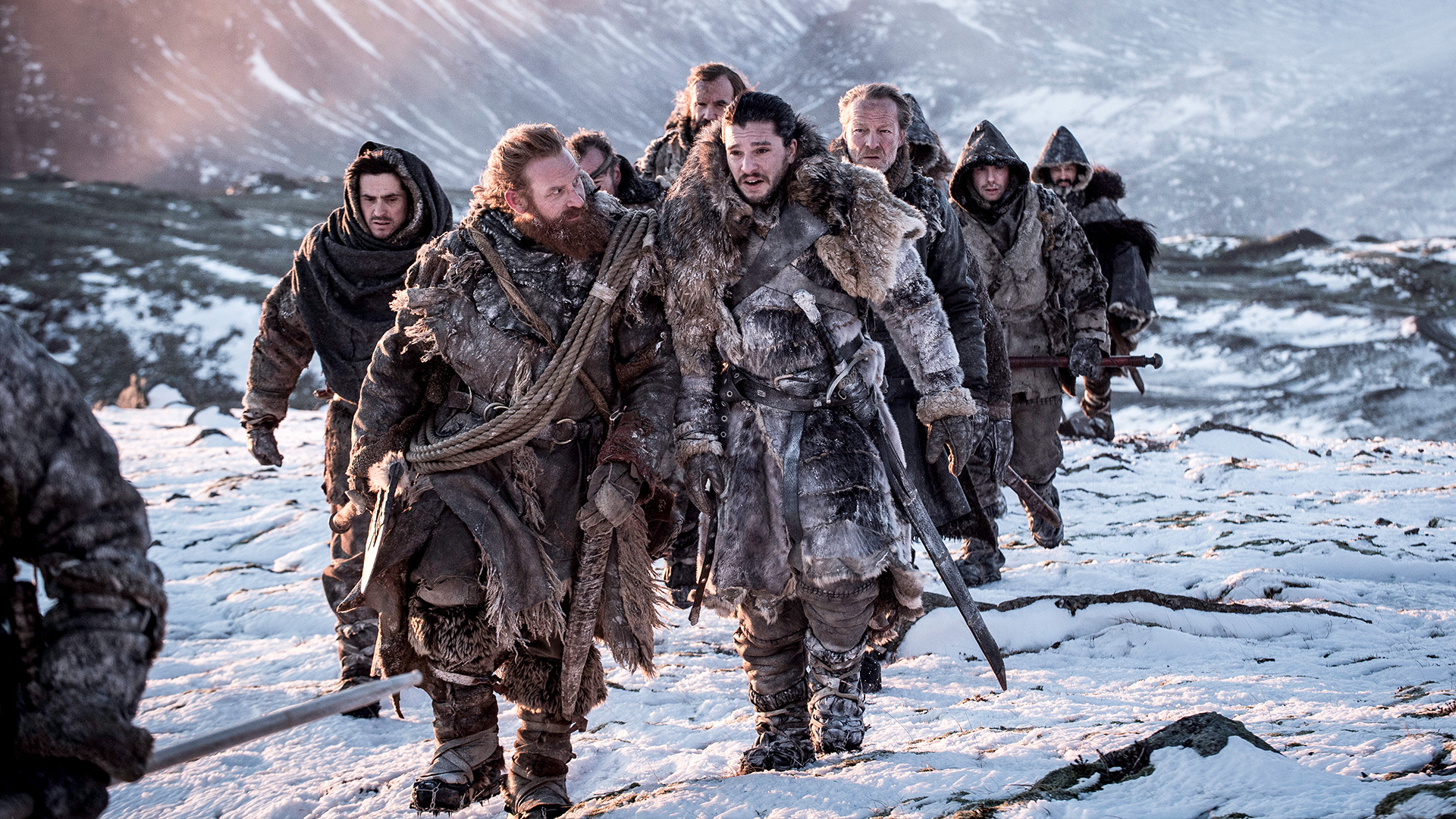
The penultimate episode of Game of Thrones‘s current season, “Beyond the Wall,” has been openly criticized by pretty much every reviewer I’ve seen so far — some even going so far as to ask if it’s going off the rails as badly as LOST did. Even the critics who enjoyed some aspects of the episode still couldn’t get past some plot holes and character choices that left a sour taste in their mouths.
To be fair, a show that invites us to explore a world of magic, prophecies, dragons, direwolves, and undead armies is already asking us to partly suspend our disbelief. But that disbelief is only possible when a story stays true to its own personal truths. And it seems like some of the story choices in this episode have ruptured some fans’ suspensions of disbelief past the breaking point while seriously lowering their expectations for the show’s endgame.
Since there are plenty of well-written analyses of this episode’s plot holes (like this review in The Atlantic) and its existential flaws (like this recap in The LA Review of Books), I’d like to focus on the aspect that caused me to repeatedly yell in disbelief at the TV: how poor story choices betray the show’s theme and, in the process, make the audience feel like they’re being lied to.
All Men Must Die
There are plenty of catchphrases in Game of Thrones that serve as thematic summaries, but there’s one that looms above them all.
Yes, “winter is coming” signifies the pettiness of mankind’s squabbles in the face of global threats, and “the north remembers” pays homage to the expectation that justice will always prevail in time. But no phrase better exemplifies the series’s theme from a story standpoint than “Valar Morghulis,” which translates from the show’s fictional High Valyrian to mean “All Men Must Die.”
Game of Thrones burst into the public consciousness precisely because of one narrative choice that seemed to break every storytelling rule that audiences were familiar with up to that point: the unexpected death of the protagonist.
(DISCLAIMER: Spoilers ahead, but really, these books have been in print for 20 years and the series has been on for six, so…)
At the beginning of the story, Ned Stark is our clear protagonist. He represents honor, trust, duty, and an optimistic belief in the better nature of mankind. His character is the one who always does what’s right, no matter the cost.
And, as the (non-book-reading) world was shocked to learn in the show’s first season, Ned Stark dies.
He doesn’t just die nobly. He dies as a the result of other characters being duplicitous and getting away with it. He doesn’t just lose; his death announces to the audience that this series has a different value system than all the other stories of good vs. evil that you’re used to seeing — one where being “the good guy” isn’t synonymous with being invulnerable, or even safe.
In short, Ned’s death signifies that every character in Westeros is living on borrowed time, and it presented the audience with a thematic promise: expect the unexpected.
This theme was underscored in The Red Wedding, when Robb Stark, our inherited protagonist, and Catelyn Stark, Ned’s widow, are murdered in an even more treacherous and traumatizing scene. If Ned’s death introduced us to the idea of expecting the unexpected, The Red Wedding expands on it by violating yet another treasured cultural trope: the sanctity of weddings.
After The Red Wedding, the audience is left wondering, “is nothing sacred on this show?”
And with the eventual murder of Jon Snow, the show’s third protagonist, at the hands of his own men, author George R. R. Martin seemed to have one answer for us: “No.”
Requiem for a Plot Twist
Granted, Jon’s death was a fake-out.
As we now know from the show (though not yet from the books, which lag behind the show’s narrative due to Martin’s glacial writing pace), Jon Snow gets resurrected to fight again.
But even this is a tweak on the “chosen one” trope: instead of returning from the dead with a divine calling, Jon Snow returns empty-handed. He has no idea why he’s been brought back, he gets no insight from the alleged god who restored his life, and he insists that when he was dead he saw nothing. He doesn’t return to guide the story toward a noble end; instead, he doubles down on practicality, seeking to unite the remaining human forces against the army of the dead that’s descending from the north — not because he feels that’s his purpose in this second chance life, but because it’s the only action that seems to make any logical sense to him.
This makes it all the more frustrating that his actions leading up to “Beyond the Wall” have been some of the most illogical actions imaginable. But given that Jon, Daenerys, and the other main characters are mostly children trying to make up for the mistakes of their parents, I think the audience can forgive some logical missteps. These characters, we’re reminded repeatedly, aren’t perfect, and there are plenty of mistakes to be made in war.
No, it’s not the illogical character choices that frustrated me in “Beyond the Wall” as much as the way their resolution violates the show’s repeatedly established theme.
When Is a Theme Not a Theme?
Instead of expecting the unexpected and trusting that the show will exploit the vulnerability of every character, no matter how important they seem to be to the larger narrative, this episode of Game of Thrones (and, really, this season as a whole) is suddenly telling us a different story: that main characters are safe, that some tropes (like romance and nobility) are inviolable, and that not all men must die.
To understand why this feels so off, let’s glance back at another recent episode.

As one reviewer noted about the Loot Train Battle that highlighted this season’s midpoint, Bronn — a beloved secondary character — should have died. He made two specific choices within the narrative that, by all logical reasoning, should have gotten him killed, including saving Jaime Lannister — a beloved main character — from death by dragonfire during Jaime’s own suicidal death-charge.
In truth, either of these characters could have died as a result of their actions and it would have not just made logical sense but also felt thematically appropriate.
Instead, we’re asked to believe that Bronn not only saved Jaime by knocking him into a river in his full battle armor, but that they were able to swim to safety downriver, sight unseen, and emerge with zero battle damage. They’re right back to making salty observations in the very next episode, as if the whole thing never even happened. Despite seeing mass destruction throughout the battle, the only two named casualties we’re asked to mourn are Randyll and Dickon Tarly, two characters we’ve barely gotten to know.
If the show can’t even kill Bronn when it would make sense logically and emotionally, why should we trust it to deliver scares and tragedies that catch us off guard?
This is the crucial dissonance that hangs like a dark cloud over the events of “Beyond the Wall.”
Because now that we’ve started to believe our main characters are more like traditionally impervious heroes, we’re not just watching the episode wondering what might happen; we’re also warily watching it to see how much of its own metatextual narrative it upholds.
Instead of asking “will a beloved secondary character like Jorah or Tormund die on this noble but foolish mission,” we’re forced to ask, “does this show still believe the conceit it was established upon?”
Unfortunately, after the Hound saves Tormund from sure death with the flick of a wrist… and Dany’s dragons descend to rescue all but one of the heroes… and Jon Snow inexplicably emerges from a watery grave only to be saved from yet another otherwise-unwinnable battle by the out-of-nowhere intervention of a character we literally haven’t seen all season… we have the answer to our question: “no.”
“But wait,” you may be wondering, “what would have made this episode feel truer to its theme? After all, a dragon died and got turned into a zombie. You can’t say that was expected.”
That’s a fair point. I also didn’t expect the Night King to have ice javelins and monster dredging chains laying around, but hey, when your entire episode is based around a deux ex machina, why stop with just one?
But while Viserion’s death is both emotionally affecting and narratively surprising, it’s also telling that the biggest casualty in yet another set-piece battle on this show is a character we barely know. (Plus, in the case of the dragons and direwolves, most of our emotional reaction to their deaths is a primal reaction to seeing animals suffer, no matter how much story logic might support it.)
What would have made even more thematic sense?
I could offer multiple suggestions, but here’s one that the dialogue literally sets up and then deliberately fails to pay off: when Beric and Jon are discussing their various resurrections early in the episode, Jon laments that he has no idea why he’s been brought back from the dead. Beric’s advice amounts to, “hey, me either, but defending the ones who can’t defend themselves seems like the best use of our second lives.”
Thus, if Beric or Jon had sacrificed themselves to ensure that the others could escape, that would have been a literal encapsulation of the show’s theme and the characters’ own self-stated motivations while also feeling thematically and narratively satisfying. (Or, in Jon’s case, frustratingly unsatisfying, which is kind of the point.)
Instead, every character with a stated motivation and character arc whose death would have made this episode feel as epic as it was intended to feel survives, presumably to be threatened with yet another dire ending in the future.
At a certain point, all these narrow escapes add up to a story that’s far more traditional than the one we signed up for, and one which we can justifiably doubt to do itself justice in the end. Even worse, as Laura Hudson puts it in her review at WIRED:
So many elements of this episode are the worst kind of unbelievable: the kind where you don’t believe the characters. Game of Thrones has devoted years to developing the sweeping personal arcs of these people, so it’s a bit disheartening to watch it now and feel like suddenly I don’t know them, or perhaps that the show doesn’t. Is Tyrion not actually that smart? Is Arya not actually that discerning? Is Sansa not actually that strong?
Game of Thrones may yet redeem itself thematically by delivering a series of unexpected twists in the series’s final seven episodes, and by returning our well-known characters to behaviors that feel logically and thematically sound. But at this stage, showrunners Benioff and Weiss aren’t just asking us to suspend our disbelief in logic, in plot holes, in character consistency, or in physics and time (because seriously, how fast do ravens fly in Westeros?). They’re also asking us to suspend our expectations of the very theme that made so many of us fans of this story in the first place.
If You Liked This Post
… then you may enjoy this post that explains how to fix the story problems in Marvel’s The Defenders, or this post about the masterful ways Game of Thrones uses scene structure.
How Game of Thrones Uses Scene Structure to Reveal Character and Theme



2 Comments
Samuel · April 24, 2018 at 6:30 am
Just discovered your blog and I think you’ve got some great insights. I’m largely in agreement with this post. GoT was engaging originally for a number of reasons, but largely it was a fantasy series that even non-fantasy fans could enjoy because it felt strangely realistic, even when dragons and weird sex magic were introduced. You could transplant the characters and plot into the 21st century and have a gritty war drama, or replace killing someone with sleeping with someone’s girlfriend and you’ve got yourself a soap opera. The great action was just the cherry on the top. Season 6 was just weird. The theme violations, I think, stem from two things:
1) The frenetic pacing. A few years ago it took several episodes to walk from Winterfell to King’s Landing. Now it’s all over the place and incoherent as a result. This could have been avoided by having a normal ten-episode season. I just don’t understand the decision to reduce the episode count to seven. They weren’t lacking for material; instead, they tried to squeeze too much material into too few episodes. As the show reaches its climax we expect things to get faster and tenser, but this is ridiculous. More to the point, it shouldn’t be at the expense of logic or character development.
2) The lack of source material. We know that D&D have talked to Martin about the ending of the book, but how much they’ve been told is unknown. It’s very, very obvious that they’re no longer adapting a book, but just making stuff up on the fly. Earlier on, D&D made some good decisions regarding the changes they made – the Arya/Tywin subplot worked really well. Cutting out characters like Lady Stoneheart and Coldfingers made sense to streamline the adaptation. Controversial though it was, replacing Jeyne with Sansa as Ramsey’s wife also made narrative sense (the cast is big already without making it bigger). The lack of a central framework to work from now means they’re no longer editing an existing narrative, but making stuff up, to its detriment.
Even Martin himself seems lost in his own creation. The books are so big and complicated, and it’s clear that Martin isn’t a very organised writer. He’s struggled to get The Winds of Winter written and he’s procrastinating. He may have an end point in mind, but he has no idea how to get there. It’s possible he’s just bored with it, and I think that’s understandable. At any rate, there’s a lack of source material and D&D are reluctant to remove characters’ plot armour as a result.
Here’s hoping that season 8 is worth waiting for.
Justin · April 24, 2018 at 9:29 am
What’s really interesting to me is that we’ll never completely know what aspects were D&D’s and what were Martin’s. Even after (if?) the final book(s) come out, we won’t know if Martin borrowed from D&D’s ideas, or changed his own once he saw fan reaction to them onscreen. I do wonder how much Martin dragging his feet is just the pressure. Writing for a dedicated readership must feel a lot less stressful than writing for a frothing 24/7 fanbase that micromanages your every choice in real time.